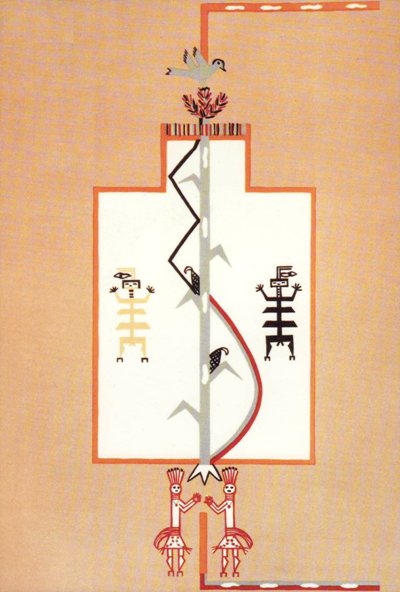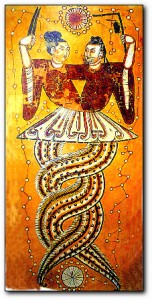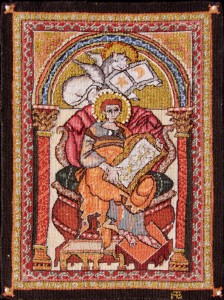![Will_McWhinney_photo[1] Will McWhinney](http://hans.wyrdweb.eu/wp-content/uploads/2007/08/Will_McWhinney_photo1.jpg)
Will McWhinney

The Navajo Pollen Path
“Oh, beauty before me, beauty behind me, beauty to the right of me, beauty to the left of me, beauty above me, beauty below me, I’m on the pollen path.”
About ten years ago I met Will McWhinney.
Will became the most influential person in my whole life. He died this year.
Will wrote just one book called Paths of Change.
Paths of Change is based on the ancient Navajo Pollen Path.
Will was an expert in the myths and culture of the Ancient Tribes that lived in the Four Corners-area of New Mexico. Every year he organized a seminar in the Ghost Range for his ex-PHD-students. I visited many of his seminars and fell in love with New Mexico and the ancient cultures (Hopi!) that live in this area.
Will tried to write a second book called Grammars of Engagement. The book is about Coupling or Entrainment. For about ten years we discussed many of his ideas.
Unfortunately his book was never finished. The reason it was never finished can be found in Paths of Change. Will was not able to apply his own theory. Strangely enough this proves his theory.
Let me try to explain the theory of Will. The theory of Will is based on his reflection about the Practice of Change.
He did not write the book alone. He discussed his intuition with all his colleagues of UCLA (University of Los Angeles).
What they wanted to resolve was a very strange pattern behind the failures of Personal and Organizational Change.
Will and his colleagues found out that the explanation was simple. Human beings don’t think the same. They are unaware of this. Almost everybody is convinced that all humans think the same. This is the main reason why many people don’t believe the theory of Will. This again proves the theory.
Will discovered four basic ways to think. He named them Mythic, Social, Unity and Sensory. The four ways are completely independent.
The consequence of Path of Change is that You reader when you are not of my world will read this article and think you understand what I am trying to say but in reality you understand something else.

The Chinese Pollen Path
When I meet you you will prove this when I ask you to explain what you think I am trying to say. The only way to explain the theory is to detect your worldview and use your language to tell the same thing.
When I do that you will think I am explaining a different theory. Probably you will ask me why I have changed my point of view (= world-view) and I have to explain you in your language that I did not do that. This will cause the same problem. You will think I am inconsistent.
When you are living in a world with only one world view you are according to all the Best Practises in Mental Ilness (Interpersonal Theory) highly disturbed.
Many people are able to think in two world views. They are able to switch from one world view to the other.
The amount of different combinations of Two of the Four Worldviews is Twelve (4×4 = 16 but 4 are the same x the same = the same -> 16-4 = 12). Will named the 12 Duals Games but you can also call them Apostles (with Jezus at the Center 12+1 = 13), Knights (of the Round Table with Arhur at the Center) or Constellations (of the Zodiac with the Sun at the Center).
Some people are able to switch to all of the world views. When you are able to switch to the worldview of the other you are able to explain the same thing differently. You are able to look at the world with a shared view.

The Four Worldviews in the Book of Kells
When both our worldviews are the same we will agree on everything but both of us will not see the others. This is the main reason why people with shared worldviews join in all kinds of cooperation’s. They join because they need a secure place that shields them from the strange outside world.
It is also the reason why people with different world-views leave a cooperation in due time. They feel the others don’t understand them. Clusters of shared world-views become highly inflexible when the outside world changes.
When you are a Sensory you will say “what I read until now is highly theoretical. I want to see facts and prove. Is the theory of Will tested?”.
Although Path of Change is Best Practice you will not accept what he is writing. You want to experience the theory yourself and perhaps 20 years later you will write a book telling the same thing. You will write a book full of examples because you love examples. You will be convinced it is telling something very different Will was telling. Happily Will has also written a book that uses examples and cases to help You.

Luke the Evangelist with the Sheep, the Symbol of the Social
When you are a Social you want to know the opinions of important social scientists and others you feel are of importance. You believe important people are telling important things and you have never heard of McWhinney so his theory is not important to know.
When you are a Unity you want to know the Rules. You want to be told what to do and most of the time you do what the Rules tell you to do. The book Will has written is without Rules it contains concepts and ideas. You think concepts and ideas are not concrete. You even don’t like some of his concepts because they are not according to the concepts you think are true. They are violating your System of Thought. You believe in absolute truth.
When you are a Mythic you believe everything is possible. Life is full of opportunities. You generate ideas and concepts all the time. A Mythic creates his own unique theory and his theory is really a theory about himself. A Mythic is unaware of this. To become aware of this he has to face the facts. He needs to switch to a Sensory world view or accept the view of an other who is able to see the world this way. This is very difficult for a Mythic because a Mythic is very Will-full.

John the Evangelist with the Eagle, the Symbol of the Mythic
A Mythic is convinced he is the only person who understands the World and some day the World will understand what a genius he is. This will never happen when he is alive. Mythics become a Myth when they are dead.
A Mythic is also an artist. He produces paintings, poems and even theory but his theory is mostly incomprehensible for others just like poetry.
Only Mythics understand Mythics. They feel the Field of Meaning. A Mythic does not understand that the others don’t understand him because his poetry is `the way it is`. It tells everything there is to say.
Will’s basic patterns were Mythic and Social. He was also able to switch to Unity. His blind spot was Sensory. Although many people were very enthusiastic about his book he did not see the facts about his success.
As a Social he focused on the recognition of important social scientists. At the end of his life he was very sad about this. As a Mythic he was convinced his theory was simple and easy to understand. This created even more sadness. Sadness and depressions are the mental illnesses when a Social becomes too Social.
Why was Will unable to finish his book? A Mythic is a highly creative person. He was constantly generating new ideas and concepts. The book was changing and changing and changing because Will wanted to create the perfect book about Engagement. Every version of the book he created was a jewel of poetry and insight. Will wanted to create the perfect book and striving to perfection is again an act of a Mythic. Will was falling in the trap of his own world-view.
What Will also did not realize that he was really writing to understand himself. Path of Change and Grammars of Engagement were a personal quest to understand the real Will McWhinney.

Mark the Evangelist with Lion, the Symbol of Unity
In the last year of his life somebody asked him to write his life-story. He tried to do this. He became aware of the fact that his whole life was centered around one personal quest. He wanted to find harmony. He never found harmony because a Mythic is on a Quest and the Quest never stops because every time when he has found the Grale he will start to look for a new Grale.
In Grammars of Engagement he started to write about Harmony.
A few citations out of his unpublished manuscript:
“All communication arises through coupling. All communications are dances that coordinate the rhythmic processes shared among the engaging systems“
“Communication is not a transmission of information, but rather a coordination of behavior among living organisms through mutual structural coupling. Coupling, the instrument of coordination, is established by the physics of exchange and by traditions that associate both human relations and communications with music: harmony, rhythm, tone and tune”.
‘Just right’ communication work because it allows systems to exchange energy, thus information, through entrainment. They dance to a just right message. The communication follows from exchanges that take place as the systems draw each other toward a common resonant mode. Systems communicate in the process of being more similar, approaching a harmonious state at least in the domain of the communication. Entrainment stops short of perfect harmony. With perfect harmony there is no exchange. ‘Just right’ is becoming close to harmonizing”.
What Will is describing is a dialogue. Will was always playing with his own thoughts. He was busy with an internal dialogue called Reflexion. Intense reflexion is a Mythic Process. When you only talk with Your Self there will be no difference. You are similar with yourself and the internal dialogue stops. You are in harmony.

Matthew with the Bull, the Symbol of Sensory
To make a difference you have to introduce others like your wife or your mother. People talk internally and externally with many voices. Most of them do this without noticing. They are not aware of the many personalities they are. They are not similar to themselves and therefore “out of balance”.
To become balanced they need to talk. A huge amount of conversations (gossip) are aimed at creating an internal balance. To find internal balance people look for people that are similar. Again they need a secure place that shields them from the strange outside world.
When people are constantly moving in similar environments they will never find their Kernel, The Self. It will be watching unable to interfere in the many dialogues that are taking place.
When the Self is unknown, people will not accept the theory of Will. They will be switching from one theory to the other without finding rest.
When they find themselves they will not need the theory of Will because they will be able to play with all the world-views. This is a paradox. It also proves the theory of Will because Will tried to explain that Life is a Paradox.
Another citation: `The process of coming close to harmonizing is visible in an old example. Automobiles and farm machinery once had clutches. These clutches consisted of two plates, one attached to the driver motor, the other attached to the wheels, thrasher, or rotary saw. When the operator ‘let in the clutch’ the two plates moved flat up against each other. As the clutch ‘comes in,’ the driver plate begins to transfer energy to the follower plate getting thus it to turn. At first, the clutch slips and most of the power goes to grabbing, which produces heat. Increasingly the driving plate turns the follower. With full ‘letting in,’ the two turn together. There is no more heating; they form a unit with no further visible communications. The coupling established at the molecular level joins the material of the driver and follower plates in transmitting power to the wheels and cutting blades. This clutching sequence is a model of entrainment. We can recognize similar entrainment sequences in many other situations: a spoon stirring batter in a bowl, cellular protein molecules latching onto antibodies, two persons entering into conversation, and 100,000 people being captured by Marion Anderson singing God Bless America at the Lincoln Memorial”
Will was unable to operate his own clutch. This was really visible when he was driving his car.

The Magician, The Mythic
He was a staccato person. He loved to work with steel and stone. He was a sculptor. His art was concrete. He loved to practice what he preached but he always practiced his theory in the outside world. He loved to help others but never wanted to be helped. This is the sad consequence of a Mythic/Social-combination.
Will showed that all the combinations are games and the Mythic/Social-game is the game of creating new games. A Mythic Social is an innovator. He is always on the front-line.
He does not see that his inventions wil be taken over by other World-View combinations that are highly practical like the Unity/Sensory-combination, The Expert.
Expert always think they have invented things themselves and never give the Mythic/Social the credits. This is a fact of life but Mythics don’t accept the facts of Life.
His books are wonderful pieces of English words I never heard of. He was a child of a highly educated family in Boston. His mother and father did not love him. They wanted him to become somebody. At the end of his life he was convinced he had failed to satisfy the ambitions of his parents. He told everybody this was the fatal trap in life.
Will was not only a Mythic but also a Social. Socials are highly influenced by Others. Of course parents play the most important role because a young child is incapable of resisting their influence. The Self of the young child is watching.

The End of the Pollen Path, The Dove, The Fifth Worldview, Consciousness
In the internal dialogue of Will his mother plaid a very important role. In his external dialogue he looked for a similar person and his wife plaid that role. He was unaware of this. He was constantly fighting the mother in his wife without noticing she was a different person. His wife plaid the same game. Will was her father and she did not notice Will was really looking for love and harmony.
Will promoted ”Just right” because ”With perfect harmony there is no exchange”.
Another citation:”Too Large—Overloads. Highly energetic perturbations overload a system, tearing apart the autocatalytic loops that hold its definition. Too much energy bifurcates the stable basins of a system’s memory and ultimately violates its autopoietic identity. The overly energetic perturbations leave open non-reflecting fragments of nodes: neurons, bits of stories, and social customs. These fragmented networks are no longer able to hold meanings or link to memory traces. Short of total destruction, strong perturbation will wipe out the fine structure of a receiving system, leaving it only able to operate in those sequences enforced by the invasive perturbation. To protect the networks of connections, electrical and mechanical systems have features to handle ‘over-modulation.’ With appropriate design, they digitize signals to compress the spectrum, thereby allows the message to be accepted. Human systems have a variety of means to block or censor invasive signals that violate our senses and psyches. Some at the physiological level block the energy that carries the messages; others receive, understand and reject the overwhelming impact. Blocking and the use of censorship disconnects us from the environment and preempts the discrimination they would our systems had more capacity”.

The Path of Change of the Hopi
Wills communication was Too Large.
He was a genius and his wife a normal person. He did not realize this.
His knowledge and experience was so enormous that he overwhelmed everybody.
He was looking for a dialogue but in every dialogue and project he became the leader.
He was a guru but he did not want to be a guru.
He was a child longing for his mother but he never wanted to be touched.
He cared for everybody but not for himself.
He was fighting but he wanted peace.
He wanted to create a better world but the outside world was moving into the wrong direction. He did not accept the Cycle.
He always wanted to cure himself. He wanted to find the eternal youth and searched the whole world for new treatments and medicines. He did not believe in the medical system but at the end of his life he needed the system desperately. He never listened to the experts so they left him alone.
He preached meditation but he could not calm himself.
Will was the prove of his own theory.
He was a living paradox.
What Happened?
The personality and the vision of Will McWhinney attracted many Mythic people. All of them started to play with the theory of Will in their own way. Soon it became very clear that Will had re-discovered a very ancient theory of Life.
A pastor found a relationship between the World Views of Will and the Four Apostles (see pictures in this blog). He discovered that the Four Books of the Evangelists where written to adress one particular World View of the believers.
We discovered a relationship with the very powerfull psychological theory called Interpersonal Theory, Game Theory, Conflict Theory, the Cycles in History, the Tarot, the Four Humors, the Zodiac, the Four Forces of Nature, the Archtetypes of Jung, the Myers Briggs test, the Big Five, the metaphors of George Lakoff and many many other ancient and modern theories.
Paths of Change has proved to be the perfect meta-theory to map and understand all kinds of different physical and social sciences. It shows without any doubt that a theory of everything is possible.
The most interesting find was the self-referencial nature of the theory. It is possible to map the theory on itself.
This website contains many examples of the remarkable power of Paths of Change to understand what is happening in the World. Use the tag Will McWhinney to find them all.
LINKS
A list of comparable models
About Entrainment
About Meta-Perspectives
About a Model that Explains PsychoPathology
About Engagement, A Chapter out of the never published book of Will McWhinney
About the Infinite Game
About the Game of Politics
About the Analytic Game
About the Game of the Market
About the Game of Invention
A PPT Presentation about the Paths of Change of Will McWhinney
A PPT Presentation about the World View of Will McWhinney
Paths of Change in PDF-format
About the Pollen Path
![Will_McWhinney_photo[1] Will McWhinney](http://hans.wyrdweb.eu/wp-content/uploads/2007/08/Will_McWhinney_photo1.jpg)










